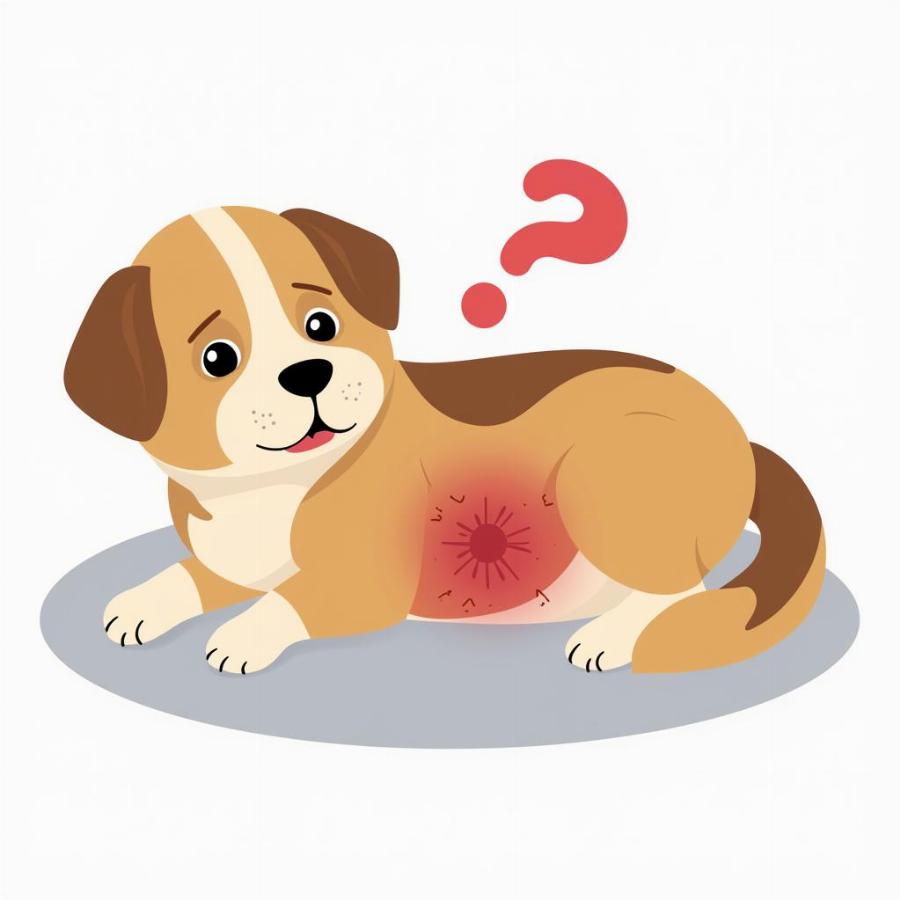Xanthan gum, a common food additive, is often found in products we consume. But what about our furry friends? Is xanthan gum safe for dogs? This comprehensive guide delves into everything you need to know about dogs and xanthan gum, from potential benefits and risks to practical considerations for pet owners.
Understanding Xanthan Gum and its Role in Dog Food
Xanthan gum is a polysaccharide, a type of carbohydrate, produced by the fermentation of glucose or sucrose by the bacteria Xanthomonas campestris. It acts as a thickening and stabilizing agent, preventing separation and creating a desirable texture in various food products, including some dog foods. You might be surprised to learn how often xanthan gum appears in commercial pet food, especially in wet and canned varieties. It’s often used to improve the consistency and palatability of these foods.
Is Xanthan Gum Safe for Dogs?
The general consensus is that xanthan gum is safe for dogs in small quantities. The FDA considers it a safe food additive for humans, and this generally extends to dogs as well. However, like any ingredient, excessive consumption can lead to digestive upset. Some dogs may also have individual sensitivities or allergies to xanthan gum, resulting in symptoms like diarrhea or vomiting. Always monitor your dog after introducing a new food containing xanthan gum.
Can Dogs Eat Xanthan Gum in Large Amounts?
While small amounts are generally safe, large quantities of xanthan gum can cause digestive issues in dogs, such as gas, bloating, and diarrhea. This is because xanthan gum is a soluble fiber, which can ferment in the gut and produce gas.  Chó Bị Đau Bụng Do Ăn Nhiều Xanthan Gum
Chó Bị Đau Bụng Do Ăn Nhiều Xanthan Gum
Potential Benefits of Xanthan Gum for Dogs
Though primarily used for texture, xanthan gum may offer some minor benefits for dogs. As a soluble fiber, it can help regulate bowel movements and potentially contribute to a feeling of fullness, which can be helpful for weight management in some dogs. It can also contribute to the overall palatability of their food, making mealtimes more enjoyable.
Xanthan Gum in Dog Food: What to Look For
When checking your dog food’s ingredient list, xanthan gum will be listed by name. Its presence isn’t necessarily a cause for concern, but be mindful of the overall composition of the food. A balanced diet with high-quality protein sources and essential nutrients is paramount.
What if My Dog Has a Reaction to Xanthan Gum?
If you notice any adverse reactions after introducing a food containing xanthan gum, discontinue use and consult your veterinarian. They can help determine if the xanthan gum is the culprit and recommend alternative food options.
How to Introduce Xanthan Gum to Your Dog’s Diet
If you’re considering adding xanthan gum to your dog’s homemade treats, start with very small amounts and observe for any reactions. It’s best to discuss any dietary changes, including the addition of supplements or new ingredients, with your vet.
Conclusion
Xanthan gum in dog food is generally safe in moderate amounts. While not essential for canine nutrition, it serves as a functional ingredient that improves texture and palatability. Always prioritize a balanced diet and consult your veterinarian if you have concerns about your dog’s food or observe any adverse reactions.
FAQs about Xanthan Gum and Dogs
-
What is xanthan gum made of? Xanthan gum is produced by the fermentation of sugars by the bacteria Xanthomonas campestris.
-
Is xanthan gum toxic to dogs? No, xanthan gum is generally not toxic to dogs in small amounts.
-
Can xanthan gum cause allergies in dogs? While rare, some dogs may have a sensitivity or allergy to xanthan gum.
-
How much xanthan gum is too much for a dog? There’s no specific threshold, but excessive amounts can lead to digestive upset.
-
Should I avoid dog foods containing xanthan gum? Not necessarily, but consider the overall quality and balance of the food.
-
What are the signs of a xanthan gum allergy in dogs? Symptoms may include vomiting, diarrhea, and gas.
-
Can I give my dog xanthan gum supplements? It’s not recommended to give xanthan gum supplements without consulting a veterinarian.
Related Questions and Articles
Beaut Dogs is your trusted source for all things canine, providing expert guidance and reliable information on dog breeds, care, and nutrition. When you need expert advice, contact us at Email: [email protected] to get detailed and accurate answers from Beaut Dogs. Visit us at https://beautdogs.com for more valuable resources to help you navigate the wonderful world of dog ownership.